Strategies for Youth: No More Deceit During Massachusetts Juvenile Interrogations

CAMBRIDGE, MA – June 10, 2025 – Massachusetts must stop allowing officers to use deceit and deception during interrogations of youths by passing H.1979/S.1065, “An Act Prohibiting Deception in Juvenile Interrogations,” Cambridge-based nonprofit Strategies for Youth (SFY) declared in written testimony to the Joint Committee on the Judiciary on Tuesday.
Nebraska Legislators Should Reject Trying 11-year-olds as Adults, Strategies for Youth Declares in Letter

CAMBRIDGE, MA – March 20, 2025 – The Nebraska Legislature should soundly reject lowering the age that children could be tried as adults from 14 to 11, Strategies for Youth Executive Director Lisa Thurau declared in a letter to legislators Wednesday.
Policing of Youth with Disabilities, Experiencing Mental Health Crises, or Impaired by Drugs or Alcohol

SFY’s Model Policy #8 – Policing of Youth with Disabilities, Experiencing Mental Health Crises, or Impaired by Drugs or Alcohol – is featured in the Winter 2025 Issue of Juvenile Justice Update. This policy provides a framework for recognizing indicators of disability, mental health crisis, or drug or alcohol impairment in youth and explains how these conditions may affect youth in their encounters with law enforcement. It provides guidance on the least intrusive, most effective approach in interacting with these youth, and directs officers, wherever feasible, to avoid unnecessary arrests andjuvenile legal system involvement, and to de-escalate interactions with youth.
S.F. youth groups want more protections from police

SFY Model Policies have been recommended San Francisco Police Commission and are in the the process of being adopted by the SFPD.
Use of Force with Youth

SFY’s Model Policy #5–Use of Force with Youth– is featured in the Fall 2024 Issue of Juvenile Justice Update. This policy directs officers to use the least amount of physical force possible to effect a lawful law enforcement purpose, and recommends standards of use, including restricted use and prohibitions, for specific types of weapons, restraints and use of force on youth.
Miranda Warnings, Waiver of Rights and Youth Interrogations

SFY’s Model Policies are featured in the Summer 2024 Issue of Juvenile Justice Update. Model Polices covered in this issue focus on Miranda Warnings, Waiver of Rights, and Youth Interrogations.
Attitude with Arnie Arnesen, Podcast November 28, 2023
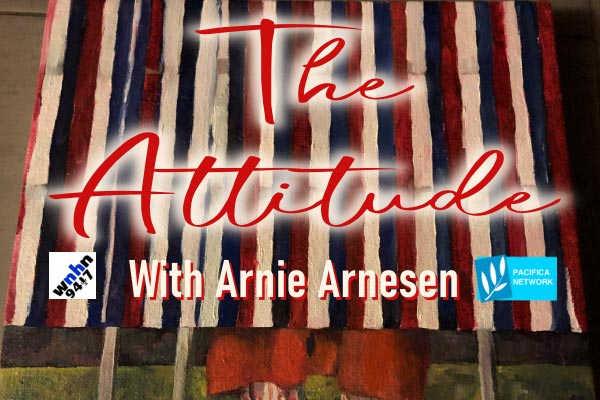
In the 2nd part of our podcast, we discuss law enforcement interaction with youth with our guest Lisa Thurau from Strategies for Youth. 90% of the offenses committed by youth are non-violent, but police are not trained to respond appropriately to youth offenders, who are developmentally different from adult offenders. SFY provides education and trainings to police and communities about how to appropriately interact with youth.
Scripps News, Focus Segment November 27, 2023

How should police handle it when young people commit crimes? A new poll by Strategies for Youth finds the majority of Americans believe there should be alternatives to being arrested.
Poll: Americans Wrongly Think Police Have Teen Arrest Guidelines

Washington, D.C. Even though most U.S. law enforcement agencies lack any guidelines about how to interact, interrogate, or arrest young people, 56% of Americans think agencies “probably” have written policies for youth interactions, a disconnect that leaves police, citizens, and communities vulnerable, according to Strategies for Youth (SFY), a national nonprofit training and policy organization dedicated to improving interactions between police and young people.
Bismark Police outline use of force protocols in wake of deadly shooting of teen

Bismark, ND. Bismarck Police Department policy and procedures regarding the use of deadly force are based on state law and U.S. Supreme Court decisions, not a suspect’s age, a spokesman said in the wake of a weekend incident in which officers shot and killed a teenager. The death of 17-year-old Nicholas Bruington early Sunday has prompted questions from some members of the public about why officers didn’t use less-than-lethal measures. There also has been plenty of support for officers who face difficult situations.
Rebuilding relationships between youth, police

A new report from the non-profit Strategies for Youth calls for a wholesale re-evaluation of how America’s law enforcement agencies deal with children and teenagers. Executive Director Lisa Thurau is Jim’s guest on “The Final 5.”
Joan Esposito, WCPT 820 Chicago, interviews Lisa Thurau from SFY

Shelley Jackson and Lisa Thurau wrote an article in Washington Monthly called, “Police need to do a better job with young people.” Lisa Thurau joins us to talk about what can be done on both sides of the equation to make these interactions better.
Police Need to Do a Better Job With Young People

On May 25, 2020, in Minneapolis, Darnella Frazier, then 17, bravely recorded Derek Chauvin’s murder of George Floyd. Her shocking images circulated the globe and helped lead to the police officer’s conviction and, most recently, a Justice Department report examining the Minneapolis Police Department (MPD) and its record of civil rights violations.?
Juvenile Justice Jeopardy: Teaching Kids to Engage Safely with the Police

The first time I led Juvenile Justice Jeopardy (JJJ), an educational game designed to teach young people about the law and how to safely interact with law enforcement, a young man, no older than 16, pulled out a fake gun and shot me.
More than a game: ‘Juvenile Justice Jeopardy’ bridges gap between police, youth
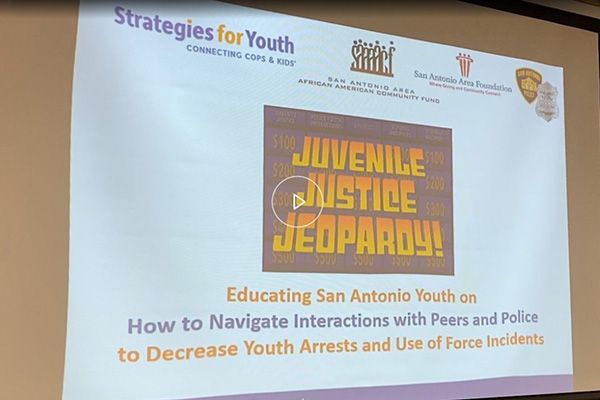
SAN ANTONIO — San Antonio leaders want to build good relationships and educate our kids, with the goal of hopefully keeping them out of the criminal justice system.
To Ensure The Best Outcomes For Youth, All Officers Need Our Training.
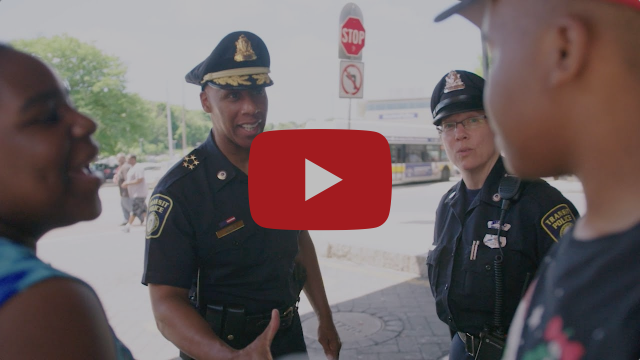
With the return of students, the debate over whether law enforcement officers should be placed in the nation’s public schools continues to rage. SFY offers parents and school decision makers practical resources to help them keep the schools safe and productive for all students.
Look what your gifts made happen for young people across the country!
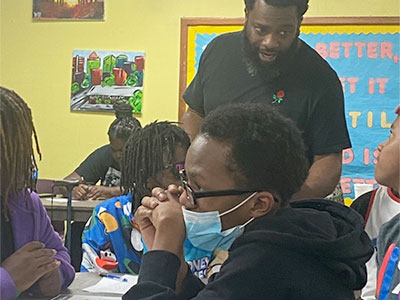
Strategies for Youth is sending you a Big Thank You for supporting our Keep Kids Safe This Summer campaign in June. Your generosity has enabled us to customize different versions of Juvenile Justice Jeopardy games for youth living in different regions of the country.
Check Out SFY’s Tools for what SROs Can & Can’t Do in Your Kids’ Schools
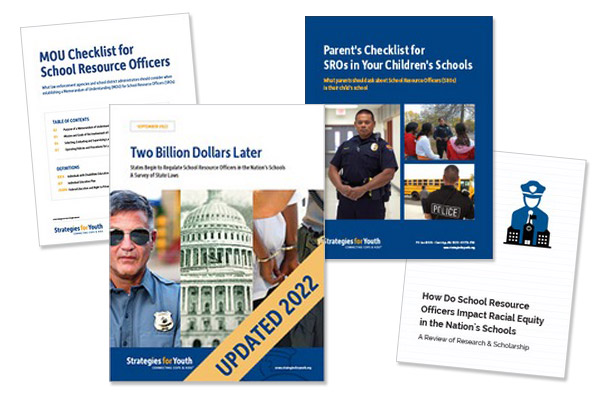
With the return of students, the debate over whether law enforcement officers should be placed in the nation’s public schools continues to rage. SFY offers parents and school decision makers practical resources to help them keep the schools safe and productive for all students.
SFY’s Summer Co-op Calls for Police Training & Policies and More JJJeopardy in the Meantime

Abby Howard joined SFY as a Northeastern Law School Co-op during the summer of 2022. Below she writes about the conclusions she drew from her research on policies and standards for law enforcement officers’ interactions with youth and playing Juvenile Justice Jeopardy in the metro-Boston area.
Nine ‘Urgent’ Steps to Improving Youth-Police Relations

When it comes to police reform, the kids are not all right. That is apparent from videos and news accounts that assault us almost daily. Over and over again, we see instances of children?some as young as six years old?and teenagers being needlessly traumatized at the hands of law enforcement.
I am a child
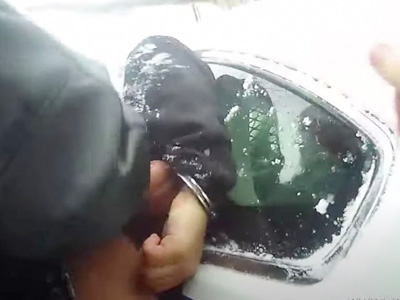
Events involving law enforcement and youth in Rochester, New York, Kissimmee, Florida, and now from Aurora, Colorado illustrate the dangers to children when law enforcement agencies and officers do not use policies that restrict use of force with children and youth.
9-year-old girl’s brutal treatment at hands of police shows dangerous lapse in policy

While she cried for her father, police pepper-sprayed and forced her into a patrol car. This girl isn’t alone, and states need procedures to protect them. A mom called police saying her 9-year-old daughter was suicidal and threatening her in Rochester, New York. The first officer to respond to the incident, which happened last week, called dispatch for backup, and six cars rushed to the scene. Officers gave the girl little time to calm down, while dragging her in the snow, cuffing her and shoving her in a patrol car. When she refused to put her feet into the vehicle, and continually cried out for her father, officers pepper-sprayed her into submission.
A special “this year only” opportunity
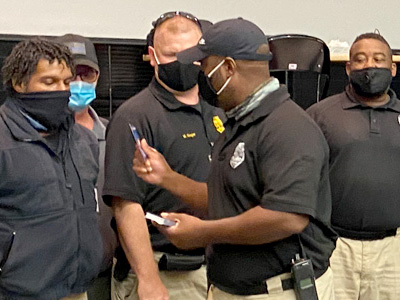
Courtesy of the CARES Act, those who take the standard tax deduction can take a $300 deduction above their adjusted gross income (AGI). The $300 deduction is for donations made in cash, which includes currency, checks, credit or debit cards, and electronic funds transfers.Those who itemize their deductions can take a 100% deduction off of their AGI this year only. Normally, this deduction is phased out at 60%.
A message from Debbie Lashley & Geordie McClelland Co-Chairs of SFY’s Board of Directors

As we close out 2020, we want to thank you for your support of Strategies for Youth. In a year with so many challenges, many things have been made clear, chief among them for us have been the importance of Strategies For Youth’s work and the importance of the support of donors like you.
WHY SFY MATTERS: We Bring Youth Voices to Law Enforcement–Chief Russell Bentley
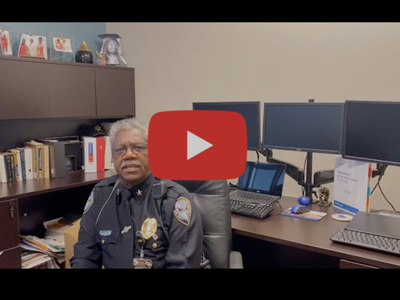
We asked, ‘What do you find useful and compelling about our programs.” For Chief Russell Bentley, the answer was easy. “This is exactly the kind of training I was looking for. It helps our SROs treat the whole child.”



